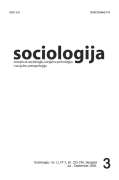Vrednovanje dečje mašte u evropskom kulturno-istorijskom kontekstu
Evaluation of Child Imagination in European Cultural-Historical Context
Author(s): Slavica Maksić, Zoran PavlovićSubject(s): Psychology
Published by: Sociološko naučno društvo Srbije
Keywords: child imagination; GDP per capita; postmaterialist values; communist regime; dominant religion; Europe
Summary/Abstract: Encouraging child imagination is a desirable for developing creativity in youth and adulthood, and creativity is viewed as one of the solutions to the problems the contemporary word is facing. The aim of this paper is to examine the linkage between macro-social factors and evaluation of imagination as a characteristic that should be encouraged in children. For analysis we used data on European countries encompassed by the World Values Study (1999-2004). The results indicate that wealthier and more developed countries and the citizens who are more postmaterialist oriented value imagination more. However, once cultural-historical heritage of the country is included into the analysis, evaluation of imagination changes, thus confirming the importance of living in the communist regime and, on the other hand, the influence of socialization patterns defined by the dominant religion (Orthodoxy, Catholicism, Protestantism or Islam). The concluding part discusses the implications of these results for supporting creativity in young people and contributing to the development of contemporary society which requires reliance on individual abilities and responsibilities in order to progress.
Journal: Sociologija
- Issue Year: 51/2009
- Issue No: 3
- Page Range: 263-277
- Page Count: 15
- Language: Serbian

